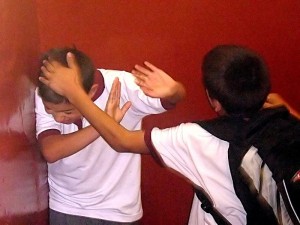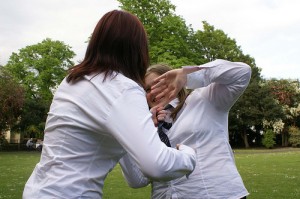In a nice example of media synchronicity, the NY Times had a front-page article today on “Online Bullying” at the same time as Inside Higher Ed published an article I co-wrote with Macaulay Colleague Sylvia Tomasch on “Honorable Technology.” The problem (or “question” is probably a better term) of ethical behavior and civil community online is one that is not at all limited just to young teenagers. I hear from faculty all the time–“what do you do if students are mean (or hostile/racist/religiously intolerant/aggressive/dismissive/obscene) in an online discussion?”
It’s not a question to be dismissed, of course. But even more, it’s not a question with absolute or definite answers. I think one of the things that online communication does best is bring together disparate people and forge community. But another thing that it can do is to damage community (and feelings). What we’ve been trying to do at Macaulay (after a few unpleasant incidents–“travails,” one colleague calls them), is to find ways to get students to engage actively with these questions–with the power and significance of the new tools we’re helping them to use. We don’t want to tell students “never use facebook” (or blogs or wikis or text messages or whatever). Certainly not! And we also want to go beyond just telling them “never be mean” or “always be nice.”

We want to ask students to consider, to contemplate, to argue about what is right and what is appropriate online. We want to engage their sense of empathy, their sense of outrage, their emotional commitment to (and struggles with) their peers and their education. In that way, we hope, they will help us to develop the standards of behavior–and they will monitor and enforce those standards because they believe in them, because they understand them, because they control the tools and want to use them effectively.

With a lot of help from ITFs, advisors, students, faculty, and staff, we’ve set up a new site for our “Digital Honors Code,” and we want it to be a live and constantly-developing code. So it’s not just a set of rules or guidelines, it’s also a set of case studies–of stories of real experiences–for students (and others) to interact with–to give their own comments, ideas, solutions and standards. And it’s an open site–we can (and want to) take comments and ideas not just from our own community, but from the larger online community with which our students also interact. We definitely hope and expect that more case studies will be submitted over time–so we can add them to the site (there are five now). And I invite everyone to have a look at the site–leave comments if you have them to leave–and help us think about this issue in ways that go beyond making rules and restrictions. It’s not the tools, it’s the thinking!



Thanks, Ben–that’s exactly what we’re hoping.
We are in “soft launch” now (since it’s summer vacation for the students), but in the fall we expect to direct all the freshmen to the site at orientation–and other students through various events and discussions. Ideally, the discussion on the site will overlap and interweave with other discussions in lots of other contexts.
The online case studies sound like a very interesting way of generating living ethics guidelines, or at least discussion. Curious to see what the students do with them.
Are you planning on formally directing students to the page, or asking them to comment, e.g. through an assignment or orientation activity?